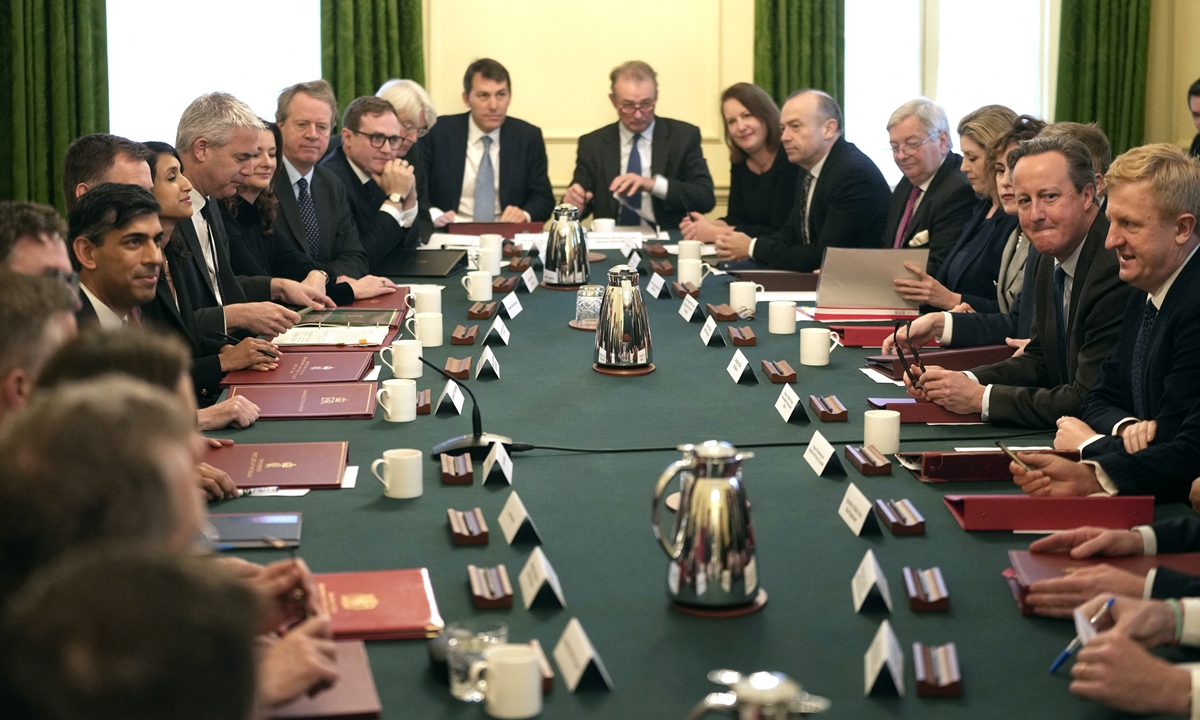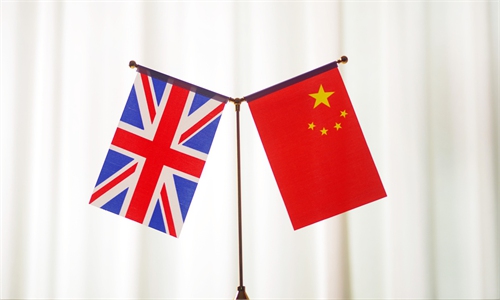
British Prime Minister Rishi Sunak (left center) chairs a cabinet meeting with his new cabinet including Foreign Secretary David Cameron (right center) who served as prime minister from 2010 to 2016, at 10 Downing Street in central London on November 14, 2023 following a cabinet reshuffle. Photo: AFP
The Chinese Foreign Ministry on Tuesday congratulated former British prime minister David Cameron on his appointment as UK's foreign secretary after incumbent Prime Minister Rishi Sunak reshuffled his top team, calling on the two sides to work together to promote the healthy and stable development of China-UK relations.
Chinese experts believe Cameron's resumé as the former British prime minister gives him a higher degree of international visibility and thus makes him a politician who could potentially play a constructive role, both in mending UK's relations with China and in rebuilding and advancing the UK's post-Brexit diplomatic landscape.
But it remains to be seen how far Cameron will follow his previous pragmatic line on China, as riding on China's economic development does not mean Cameron is particularly different from other Tory members in terms of values, they said.
Cameron, who served as the British prime minister from 2010 to 2016 and resigned after the controversial Brexit vote, made the "surprise comeback" on Monday, replacing James Cleverly, who became home secretary after Sunak sacked divisive incumbent Suella Braverman.
During Cameron's prime minister tenure, the China-UK relationship entered what was termed a "golden age" with boosted trade and investment. When Chinese President Xi Jinping visited the UK in 2015, the two leaders sipped beer at a local pub together.
But Cameron's pragmatic approach toward China in the past may be at odds with the Tory's increasingly hard-line stance today, and he now faces a tenser and more complex geopolitical situation.
Stressing the importance for the UK to "stand by our allies, strengthen our partnerships," Cameron posted on X (formerly Twitter) on Monday that "working to help ensure stability and security on the global stage is both essential and squarely in our national interest."
Chinese Foreign Ministry spokesperson Mao Ning offered congratulations at a routine press briefing on Tuesday, saying that growing stable and mutually beneficial bilateral ties serves the fundamental interests of both peoples, helps both countries to better respond to global challenges together, and contributes to world peace and development.
A possible constructive role
After Cameron's appointment, he had a phone talk with US Secretary of State Antony Blinken on Monday, discussing the Palestinian-Israeli conflict, Ukraine crisis, and relations with China, according to a release from the US State Department.
Analysts said that the UK's diplomacy is still mired in "post-Brexit confusion," and the major power game is also influencing the UK's diplomatic and strategic layout. After former prime minister Boris Johnson came to power in 2019, British diplomacy has become more and more speculative and lacks long-term strategic planning. And in its relations with China, the UK has moved closer to the US and drifted away from other European powers that strive to maintain strategic autonomy.
"Cameron is a familiar face to the international politics, with a wealth of experience and resources of contacts… As long as there are no further changes in personnel in the short term, Cameron may provide some help to British diplomacy," Cui Hongjian, professor at the Academy of Regional and Global Governance of Beijing Foreign Studies University, told the Global Times on Tuesday.
If the UK's Conservative government realizes there are obstacles and is willing to improve China ties, Cameron's experience and his visibility in China can play an important role, Cui said.
According to official data, during Cameron's tenure in 2014, China's direct investment in the UK exceeded $40 billion, the UK also became China's largest investment destination in Europe, and at that time, the UK's cumulative direct investment in China increased to $20 billion, with the fastest growth rate among Europe's major powers.
Regarding China's economic volume, economic radiation and huge market, a good bilateral relationship with China is no doubt beneficial to the UK, Gao Jian, director of the Center for British Studies at Shanghai International Studies University, told the Global Times on Tuesday.
According to Gao, Cameron's appointment probably means that Sunak hopes to use Cameron's political connections to play a constructive role in the China-UK relationship. At the same time, Cameron's political influence can be used to balance the voices of domestic China hawks.
However, Gao stressed that the direction of China-UK ties is based on the political and practical interests of the two countries, so they are unlikely to undergo any fundamental structural changes simply because of an appointment or removal of particular political figures.
Dialogue and exchanges have been resumed between China and the US, as well as between China and the EU. If the UK wants to improve its relations with China, it needs to have a detailed plan and at least release some clearer signals, Gao said.
Uncertainty remains
Another question is over the extent to which Cameron can forge his own agenda as foreign secretary. In Sunak's first foreign policy speech earlier this year, Sunak announced that the "golden age" of China-UK relations had come to an end.
The Sunak cabinet, and the wider Conservative party, has been wavering in its relationship with China, Gao said. "The fundamental purpose of calling Cameron back is to cope with the severe domestic political environment the Tories face, and to extend their rule status as far as possible."
Recent surveys in the UK show that the Labour Party is polling some 20 percentage points ahead of the ruling Conservative Party in the polls. A general election must be held by January 2025 at the latest.
"Cameron's return embodies the state of the ramped up struggle within the Tory party: On the one hand, the lack of new faces to replace [senior cabinet members], and on the other, the need to balance internal factions," Cui said.
Because the overall perception of China in the UK remains negative, the China hawks in British political scene still maintain considerable influence on the direction of China-UK relations, Dong Yifan, a research fellow at the Institute of European Studies, China Institutes of Contemporary International Relations, told the Global Times on Tuesday.
When Cameron was in power, he wanted to ride on China's economic development to bring more benefits to the UK, but it does not mean that Cameron is particularly different from other Tory members in terms of values, Dong noted, "It remains to be seen how far Cameron will follow the diplomatic line on China he pursued in the past."
Given their declining support, it is likely that the British government will be more inclined to be tough on China to secure short-term gains to secure power until the next general election, even if cooperation with China is what is good for the UK in the long run, Cui said.
Gao said the UK has failed to embrace new trends in the global community after Brexit and its lack of reflection on foreign policy and obsession with following the US has gradually alienated partners from the European continent.
China has always adopted an open policy in China-UK relations based on equality and mutual benefit and respect each other's core interests, but the UK needs a truly pragmatic spirit and principles in its diplomacy, rather than going further and further down the road of ideology, Gao said.



